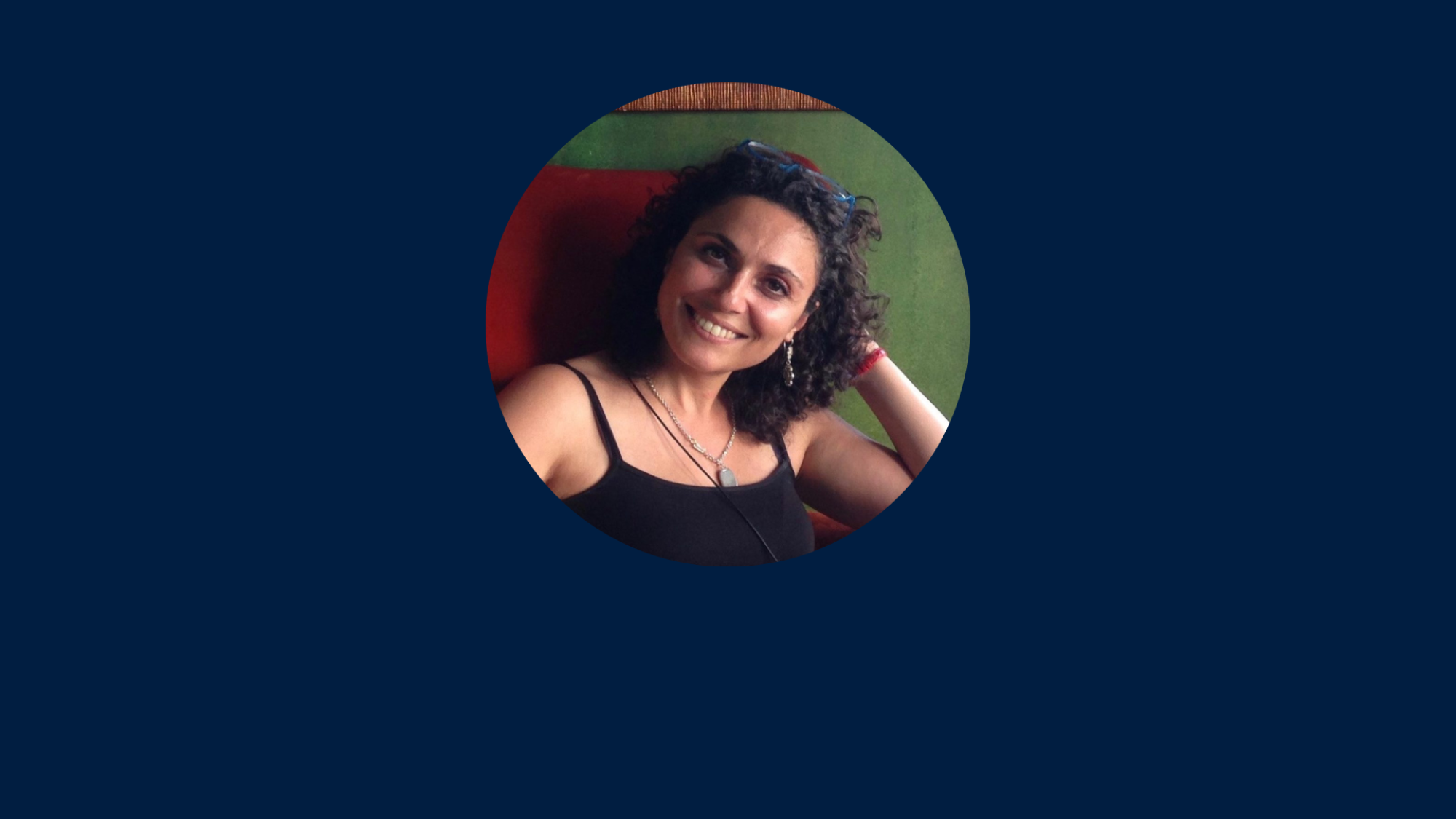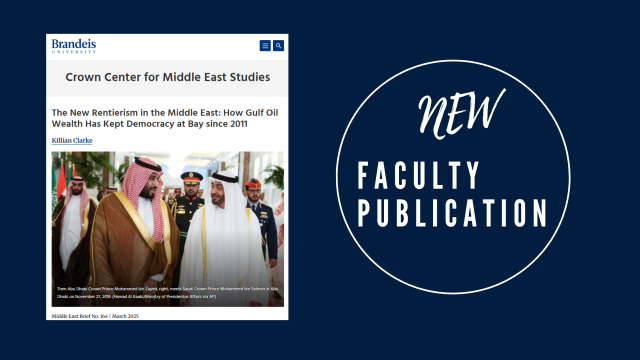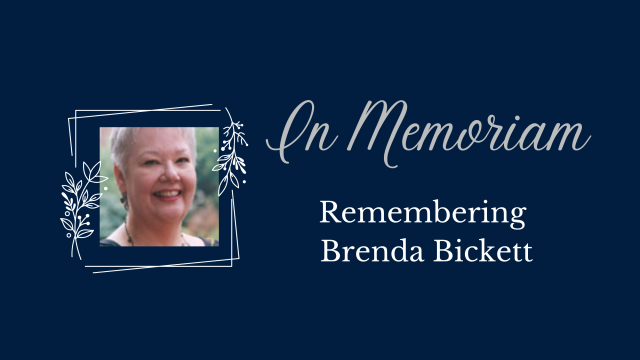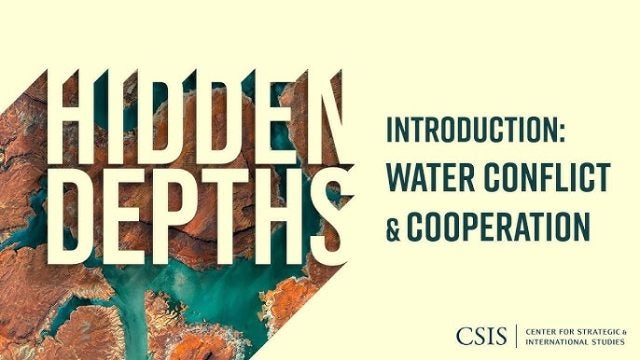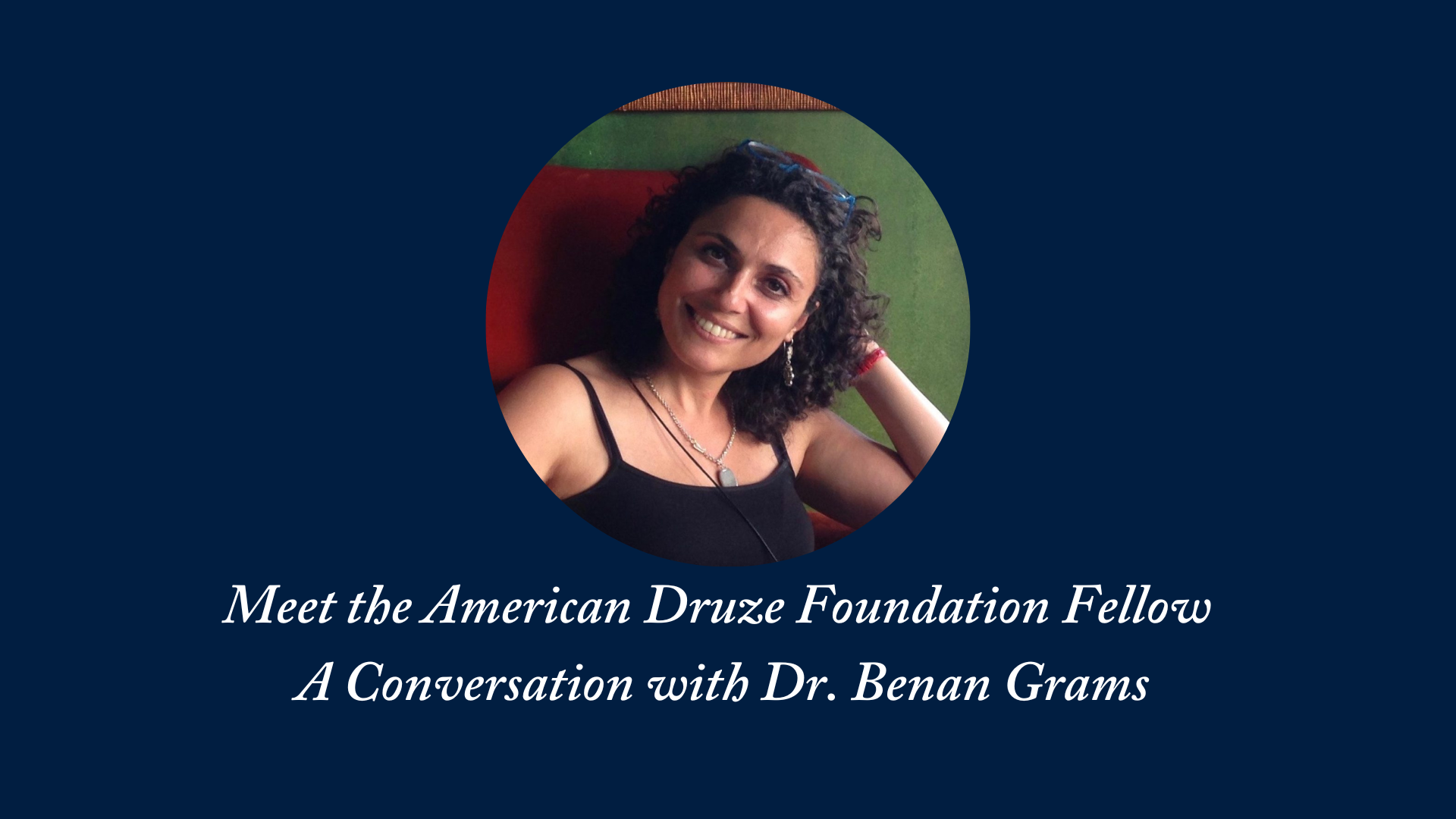
Dr. Benan Grams is a social historian of infectious disease and medicine in the Modern Middle East. Her research focuses on the intersectionality of the history of epidemic, public health, environmental history and urbanization in the late nineteenth and early twentieth centuries. Her dissertation, “Damascus in the Time of Cholera: The Social Impact of Epidemics on the Transformation of Ottoman Damascus, 1848-1918,” examines the impact of cholera epidemics, the nineteenth century’s most feared disease, on the history of Damascus and on the lives of its inhabitants.
Tait
What inspired you to pursue the study of disease and medicine in the Modern Middle East?
Grams
I started my study on infectious disease before Covid-19 pandemic was officially announced in the US in 2020. Initially, I wanted to write about communicable diseases in general including smallpox, cholera, typhoid, typhus, and dysentery. Typhus and dysentery were particularly important for me because I wanted to write about hospitals during World War I in Damascus, and these diseases are related to low levels of hygiene and nutrition, conditions that were prevalent during wartime. I was interested in the dynamics between the state and the society in what revolved around diseases during the war. Although typhus and dysentery were the most prominent diseases that I was looking at, somehow, the research led me to find more sources about cholera. But as with all history work, you become excited about your findings and curious to find where these sources and stories originated. Tracing cholera back, I found myself going beyond the years of World War I (1914 to 1918) to almost a century earlier in 1832.
I’m writing about Syria, a country that is– and has been now– in crisis and war for over a decade and accessing archival materials was not the easiest. I am Damascene, and my entire family still lives in Damascus which made my trip to Syria somewhat easier than it would have been for other non-Syrian researchers. I was also fortunate to have the support of my supervisor and department to do research in the early stages of my Ph.D. Being able to visit the archives over a longer period of time was essential to build a network with the archivists there who granted me access to various sources. However, Arabic sources were not the only ones. I had to rely heavily on Ottoman sources as well.
Tait
Can you expand on the parallels between the historical impact of disease and epidemics, such as the impact of cholera in Ottoman Damascus discussed in your dissertation to COVID-19?
Grams
First, let me tell you about the experience of writing about an epidemic while living in one. It was interesting to write about quarantine laws and practices in the Ottoman Empire while living under quarantine restrictions in 2020. I watched how people, regardless of their background, civilization, and culture, have missed and struggled to regain their most basic needs: interaction with other people. Just like in the nineteenth century, in 2020 people rebelled against and resisted imposed quarantine restrictions. The similarities are incredible. Interaction with others remains the most essential need. The pandemic made us realize that the things that we take for granted– just going to grab coffee, going shopping for your vegetables, these basic things, are crucial to us. And to be deprived of making decisions about one’s social life and movement puts people’s tolerance to test. And I think people in the 19th century felt it as much as people do now. It made me appreciate the privilege we have now of the possibility of running our affairs and businesses remotely. This is a privilege not granted to all segments of society now and certainly not in the 19th century. Then, you had to be on the job site and you had to interact with other people. That’s why there was significant resistance, and living through a pandemic was a humbling experience that made me empathize with the people in my sources.
Resistance to vaccination is another example for the similarities between past and current epidemics. In the Ottoman Empire, the state organized vaccination campaigns against smallpox as early as the 1830s and continued throughout the second half of the 19th century until the 20th century. Sultan Abdulmecid sponsored the early vaccination efforts and he himself was a survivor of smallpox who was invested in vaccinating the population. The government continued to run periodic vaccination campaigns until the collapse of the empire, then the subsequent governments carried on the same efforts in collaboration with international organizations, in particular the WHO. And there were people of course who resisted it for various reasons, including but not necessarily only out of ignorance. There are several other reasons for people’s resistance, and I can tell you one now. During the nineteenth century, several Protestant and Catholic missionaries went to the Middle East and practiced smallpox vaccination, although some were not medically trained. They performed the inoculation on children and made mistakes which led, sometimes, to death. Such incidents contributed to fear and resistance of the vaccine among the local population. At the same time, these missionaries, who came to proselytize Catholicism and Protestantism competed with the local Greek Orthodox sect and caused tension. This tension contributed to the politicization of vaccination and encouraged people to resist it so long it was performed by these missionaries. So the point of this story is to make us realize that historical events are not straightforward and you cannot draw a direct causal link between one factor and a given result. In fact, if I learned anything from this Ph.D journey, it is that there are always so many factors– obvious and hidden– that we don’t know and you cannot just draw a causation between A and B without detailed investigation.
Despite the advancement that we made in science and the many vaccinations scientists developed, there are still people who resist. And they came up with new justifications, conspiracy theories. This is very much in human nature. Whenever people don’t understand or know what’s happening, they start creating rumors, and having imaginations, and spreading those is very easy. It is now easier than before with Social Media but it did not mean that earlier they did not spread rumors and conspiracy theory. So these anti vaccination movements and conspiracy theories and unfounded rumors– they are a consistent phenomenon in history, whether in the 19th century or now.
But to end on a more optimistic note, let me tell you that, although a lot of social norms have not really changed, that does not mean nothing has changed at all. There are things that have changed of course: like better education, improved child birth rate, decreased maternal mortality rates. We even managed to eradicate smallpox and control other killing diseases like measles and tuberculosis. Unfortunately, not all aspects of this progress are equally experienced around the world and all communities. We still have a strong disparity in health profile between rich and poorer countries.
Tait
What are you currently working on as a CCAS fellow? What lessons have you taken from your Ph.D program into the work you’re doing now?
Grams
The purpose of the fellowship– post-doc fellowship– usually is to give the newly graduated doctor, in my case, historian, a chance to reflect on their work and compile a book based on the dissertation. You know, if you want to be competitive in the job market you need to check some boxes– most important of which is publication records between books, articles, and book chapters. On the medium run, I will be working towards a book manuscript, but for this coming year, I will be focusing on writing an article.
What I learned from my PhD is the necessity of collaborative work and peer discussions. Presenting one’s work in workshops, listening to other people’s suggestions, comments and critics have been very helpful to me. I was lucky to be part of a small community of MENA history students and professors. We met regularly and shared each other’s works, read them and then discussed them together. Under time pressure, one might think that these meetings were a poor use of the limited time, and participation is primarily out of collegiality and etiquette. But in retrospect, I cannot tell you enough how much I benefited from these sessions. I am definitely not going to give up on this great aspect of academia, and currently, I am a member of several writing and discussion groups. Not only because I need my colleagues’ assistance, but also because it is so enriching to read other people’s work. I learned a lot from what my colleagues’ works on, the literature they used, the questions they asked and the way they argued. In my view that is what intellectual life should be.
Tait
Many of our students may consider pursuing a PHD at some point in their careers after CCAS. How did a doctorate program support your work and help you shape your career path?
Grams
I don’t want to discourage students from pursuing a Phd and academic career. However, I don’t want to romanticize it. Ph.D., especially in humanities, takes a long time. It’s a dedication of life, of time, of lifestyle, and resources and has a high opportunity cost. You spend at least 7 years. 7 years of your life with your books and computer, mostly alone by yourself. But there are so many enjoyable elements of this journey, which might differ from person to person.
I cannot even tell you which part of the Ph.D was the most enjoyable for me. If you think about it, when else would you have the time to read so many books and delve into their contents. I loved the coursework because this is the only time when you get to read a book closely. Teaching is as much fun as reading. I don’t know how other departments or disciplines or other universities do, but in the history department at Georgetown you are assigned to be a teaching assistant in a variety of areas that are not necessarily familiar to you. I was a TA for premodern and modern European history and American history, areas that I knew nothing about. And for me that was enjoyable.
Then you go to do your research and that is where you unfold and find those troves of sources. The toughest part is when you need to pull all your thoughts, synthesize them, makes sense of them and put them down on paper. Writing is, by default, a lonely exercise. You are alone with your books and your thoughts. It’s up to the person to make the writing process more social and enjoyable either through writing sessions, writing retreats…, et cetera.
To make this long story short, a PhD is not something you do if you want to take a break from work. It is not something you do because you think you have any romantic idea of doing a PhD. It’s hard work. It chips off a lot of aspects of your life. It comes with a lot of anxiety, but it has a lot of enjoyable moments. There is nothing more beautiful than teaching students or giving them tools to think about things. You see students grow and learn new skills, when they enter your class knowing nothing or little about a subject matter and by the end of the course they write an entire paper related to it– it is such a rewarding feeling.
To sum up, I think if you are someone who writes well, I recommend it. If you are someone who enjoys investigating and arguing in a systematic and supported manner, then a PhD is recommended, if you are curious, organized and enjoy yourself’s company, then you should pursue it.
Tait
Can you talk about the course that you will be teaching in the spring? What made you start to think about the syllabus for it?
Grams
The course that I will be teaching next semester is titled “The History of Migration and Displacement in the Middle East.” First of all, I think anybody in the US– it does not matter how far back in history their family migrated to the US– is related to the idea of migration. Many Americans I met still speak about their migrant ancestors who came to the US, they identify as “my ancestors are Irish, Dutch, Polish, Scandinavian, German, British.” Everybody acknowledges their multiple origin background. With that, they are acknowledging that they are all immigrants. If a student is a native American, then they also relate to the concept of displacement and migration. The US is a country that is, and continues to be based on migration and immigration.
But more specifically, when I was asked to teach a class, I looked for a topic that, of course, has to be history since I am a historian, but at the same time relevant to our present moment and fits with my position as a fellow at a foundation established by immigrants. The American Druze Foundation, from its name, represents two locations: the Levant and the US. So I decided to teach something about movements between these two locations. Since we are in CCAS, Center for Contemporary Arab Studies, I am going to do it in the Middle East.
But you might ask, how is my research interest related to my course on migration? As a social historian of infectious diseases, I know that epidemics caused a lot of displacement, and also motivated people to move. But infectious diseases were primarily caused by movement. Whether the plague, cholera, or even diseases like dysentery that are more associated with poor conditions. They move with people’s movement. So I wanted to bring the element of disease-related movements into the course syllabus. One of the weeks that I will be teaching is on diseases and migration. But then other topics, other themes in the syllabus are about the various aspects that affect this migration and its outcome. Like, who is migrating? Only men? or also women? Who is migrating, again? Professionals? Or only laborers? Who is migrating? One particularly community from one area to another or different communities? So we encounter different questions and scenarios, it is just fascinating.
The readings I assign will be clustered around these themes. I have one week on disease, another on women and migration. I have one week on labor and migration. One week on child and migration. One week on migration and cuisine. And although it’s history, it also comes to contemporary time, since it’s an ongoing process. Another theme is migration and international organizations that were established just to manage and regulate this old phenomenon. Even the word refugee. We take it for granted but actually it is a new construct that was internationally coined in the aftermath of the second World War, which is not very far back in history.
I will provide students with theoretical tools and frameworks to explore and to think how migration-related terms came about, became institutionalized and accepted, and what their implications are on people’s lives. These concepts and ideas affect our lives everyday. I wish to study them with students in a more systematic and academic way and from different viewpoints. Like this, if any of them want to pursue that line of activities, activism in migration-related fields, they have already been exposed to different angles to it.
Finally, I have an exciting event that I want to organize with this course. I’m going to invite three guests from different disciplines related to migration and displacement. This will be a series of lectures and Q&A workshops that I will organize throughout the semesters. I’m not going to give too much away, but for a little bit of suspense, I have one event that is going to be musical. And I will leave it here.
Tait
Is there anything else you would like the CCAS community to know about you?
Grams
Of course I would like to see the students take the class because I am interested in hearing their views and reflections. I know CCAS’s students come from diverse backgrounds and with different experiences I would like them to share those with me and their peers. On a more personal note, teaching is a passion and having a lively and meaningful discussion fulfills me. I find it fulfilling to see students engaging with the literature that I assign.
I really want to highlight the importance of history to understand contemporary issues. Something that I want CCAS students to know and to appreciate is that you cannot understand what’s going on now without looking at the roots, circumstances, and conditions that informed, allowed, enabled current actors. I know that we are in the Center for Contemporary Arab Studies, but in order to understand the present, you really need to dig into how the present was shaped. History is not storytelling, history is actually a way of thinking about the past, unpacking it, analyzing it and deriving conclusions from it. That’s why writing history is a continuous activity. It is shaped by many factors including historians’ current or contemporary circumstances.
Any students interested in the current situation in the Middle East, no matter what aspect of it, development, culture and society, politics, economy– all these fields– they are not abstract. They do not happen in a vacuum. They evolved because there were certain circumstances that allowed them. And it does not stop in one era, you would be surprised about the continuities in history rather than the ruptures. You really need to look beyond the current moment. So history is essential to understanding the current situation and I think– and I hope– students get to appreciate that.
Coco Tait is the Events and Program Manager at CCAS.
